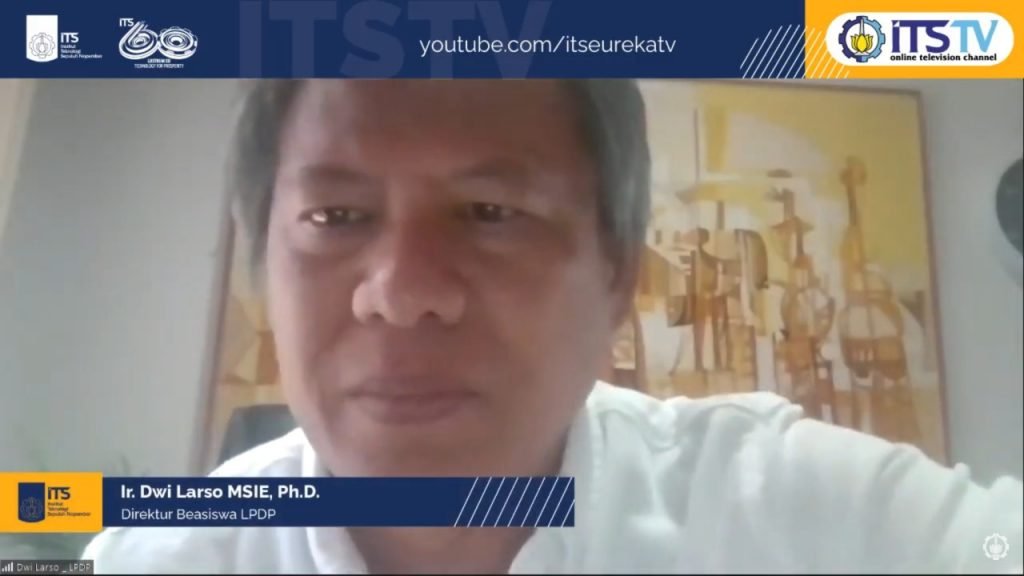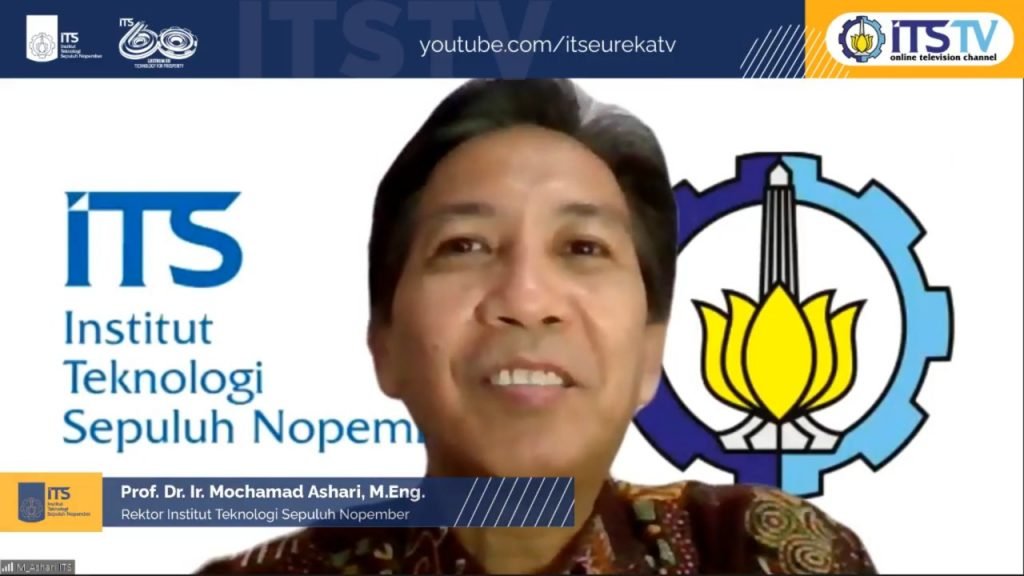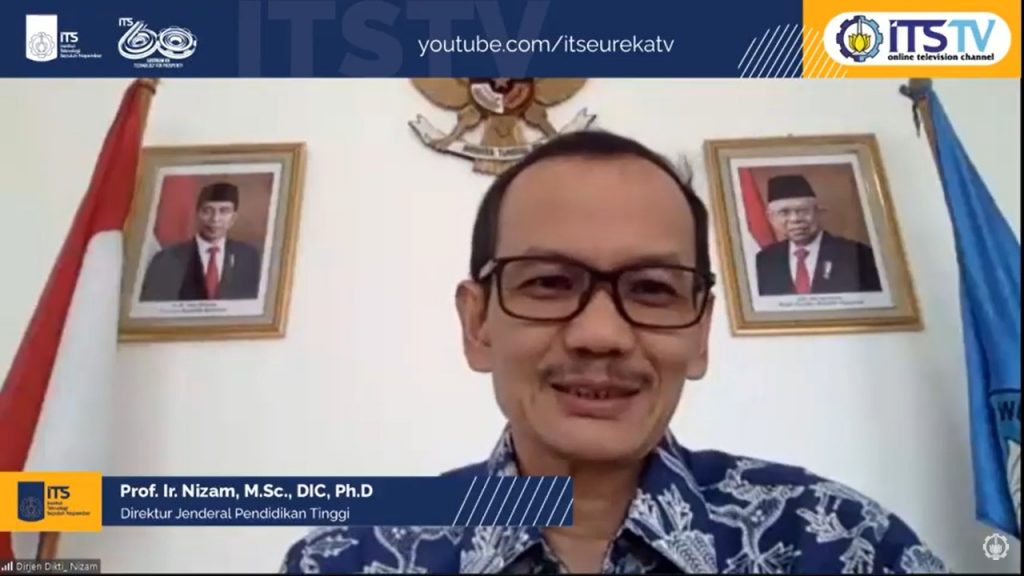With The Government, ITS Support Scholarship Programs for Graduate Students

LPDP Scholarship Director Ir Dwi Larso MSIE PhD when delivering speech in webinar
ITS Campus, ITS News – ITS as a university with a vision for the World Class University (WCU), has prepared its education strategy in the international scene through scholarship cooperation with the Directorate General of Higher Education (Directorate General of Education) and The Institute of Education Fund Management (LPDP). The strategy in seeking scholarship funding for this postgraduate program is explained in a webinar titled Synergy LPDP and The Directorate General of National Education of International Reputable, Wednesday (26/8) noon.
In this online event, ITS invited Director-General of Dikti Prof Ir Nizam MSc DIC PhD IPM ASEAN Eng and LpDP Scholarship Director Ir Dwi Larso MSIE PhD as speakers, as well as ITS Rector Prof Dr Ir Mochamad Ashari MEng. On this occasion, ITS together with the Directorate General of Education and LPDP alluded to the program of human resources development (HR) of universities and the concept of an educational revolution carried out by the Ministry of Education and Culture (Kemdikbud).

Rector of ITS Prof Dr Ir Mochamad Ashari MEng while giving exposure in a webinar with the Directorate General of Education and LPDP online
Starting the webinar, Nizam expressed urgency about the importance of honing superior human resources and research that could be useful to the community. In his statement, Nizam mentioned the profit that Indonesia will get, which will occur in 2045, namely demographic bonuses. “We are experiencing tremendous momentum that is a demographic bonus, do not let this bonus not be utilized,” said Professor of Civil Engineering Gadjah Mada University (UGM).
Not only that, but this University of London alumnus also explained the global conditions in which the intensity of international trade is getting easier with all-digital transactions, goods from overseas can also come in days. Nizam explained the polarization and bilateral approach of countries in the world such as the United States and Britain that are re-emerging. “Challenges like this must be answered with superior HR and innovation from universities,” he said.
The Surakarta-born man then revealed that in addition to the global challenges, Indonesia also has national challenges to face. Some of these are related to infrastructure issues, basic needs (clothes, food, and home), manufacturing industries that still rely on foreign licenses, industrial raw materials, and medicines that are still imported, as well as extraction and mining industries that have not been processed in the country.
According to Nizam, infrastructure development should be boosted to facilitate connectivity from land, sea, and air given the composition of Indonesia as a country with many islands. Of course, universities can take on roles through the ideas and technologies created. “The need for this technology is very real in front of us, ranging from basic human needs, energy, food, water, clothing, health, and others,” he said.
In addition, Nizam also presents a concept of Pancasila Student-initiated by Kemdikbud. Pancasila students put forward six characters, namely faithful, pious, fear the One True God, and noble, independent, critical, creative, cooperative, and global diversity. Emphasized also six aspects in scoring superior character namely general education, leadership development, lecturer mentoring (driving lecturer), civic intelligence; responsibility; and participation, entrepreneurial mindset, and a lifelong learner.

Director General of Dikti Prof Ir Nizam MSc DIC PhD IPM ASEAN Eng when attending the webinar
Furthermore, Dwi Larso talks about the importance of college graduates who should be able to provide solutions, become independent, and benefit others as well as their families. Dwi describes five aspects of Human Capital. Human Capital collective intellectual capital in the form of competence, knowledge, and skills. “A happy, prosperous, and prosperous person is bound by capital problems. Capital is a traditional problem where capital is associated with wealth and property,” said Dwi.
The Head of Business and Management School of Bandung Institute of Technology (ITB) suggested that the way to encourage people who are traditionally not capital is to encourage Indonesian people to become independent through education. From there, the role of educators, universities, and schools is very important in bringing Indonesia to prosperity. “Our protégés must have capital limitations,” the Oregon State University America alumnus said.
Dwi also explained the concept of Kampus Merdeka initiated by Kemdikbud, where the main projects of Kampus Merdeka are divided into internships or practical work, projects in the village, teaching in schools, student exchanges, research or research, entrepreneurial activities, independent studies or projects, and human projects. Hopefully, Kampus Merdeka is able to encourage Indonesians to excel by having an entrepreneurial spirit. “Finding work is not only a matter of providing workers but also the availability of jobs,” he said.
From ITS itself, Dwi mentioned the number of LPDP scholarship recipients as many as 436 people and entered into the top 10 universities with the most LPDP scholarship recipients in Indonesia. Where, the postgraduate level is taken in the master’s degree with a total of 348 recipients and a doctoral program with 88 recipients nation-wide and abroad.
Representing ITS, Mochamad Ashari also explained several reasons why ITS strongly supports the financing of education for postgraduate programs, both at the nation and abroad. First, the final mandatory education requirement for lecturers is a master’s degree. Then, when they’re already a lecturer, the college supports its academic civitas to pursue higher education, namely doctors.
Second, postgraduate in university, both the number of lecturers and students is an indicator of the quality of the college itself. “Human resources are very important, we’ve created an organization that is very in line with technology, but if the culprit can not follow it would be difficult,” said Professor of Electrical Engineering ITS who is commonly called Ashari.
Not only that, but Ashari also explained that graduate students are reliable researchers and are very related to publications that support international reputation. “Graduate students will become figures in their institutions someday on their return or if they receive international students, this international student will one day become the decision-maker in his country,” said the lecturer from Sidoarjo.
Ashari supports several postgraduate programs such as S3 joint degree, where students who get this program will one day attend school at the nation and abroad and receive two different diplomas for the same strata. “Universities in Indonesia desperately need one support scheme for joint degrees,” he explained.
ITS wants to support the quality of lecturers’ human resources by encouraging 500 lecturers to study to a higher level by holding a doctoral study bridging camp, where the agenda of activities focuses on preparing for scholarships, finding supervisors, and so on. “The hope is that our scholarship providers can continue to work together so that we can prepare for the improvement of global quality human resources,” said Ashari.
(jev/Anjani/ITS Public Relation Officer)
Related News
-
Gains Up 300 Percent, ITS Targets Increase in Scholarship Recipients
ITS Campus, ITS News – In the period 2020 – 2023, the scholarship disbursement budget collected by Institut Teknologi
August 27, 2020 17:08 -
Gains Up 300 Percent, ITS Targets Increase in Scholarship Recipients
ITS Campus, ITS News – In the period 2020 – 2023, the scholarship disbursement budget collected by Institut Teknologi
August 27, 2020 17:08 -
ITS students attend an international oil and gas conference in Saudi Arabia
ITS Campus, ITS News – Students from the Department of Ship Systems Engineering at Institut Teknologi Sepuluh Nopember (ITS)
August 27, 2020 17:08 -
ITS students attend an international oil and gas conference in Saudi Arabia
ITS Campus, ITS News – Students from the Department of Marine Engineering at Institut Teknologi Sepuluh Nopember (ITS) became
August 27, 2020 17:08
